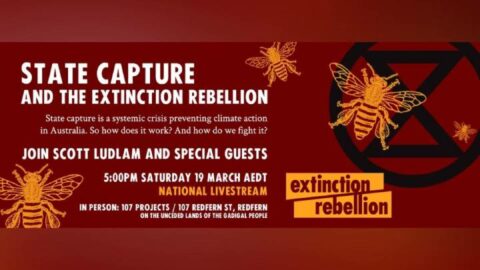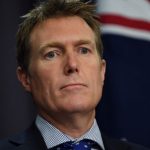“The Key Decisions Are Being Made in Boardrooms”: Scott Ludlam Talks State Capture
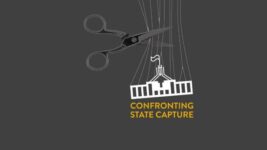
Holding the belief that the climate is changing to the detriment of people and planet, used to be unfashionable. Indeed, NSW premier Dominic Perrottet still seems to think it is.
But the shock of the 2019 climate-driven megafires brought most of us on board, and now the recent rain bombs have left few doubting.
The shock of the unprecedented late February-early March eastern seaboard floods that wiped out entire Queensland and NSW towns and swept their way into regions not seen before, such the nation’s largest city, has yet to dissipate, and neither has its fallout or the clean up.
Yet, in a NSW Central Coast town hall on Monday, ever-miraculous prime minister Scott Morrison was telling a crowd that his government supports coal, its policy is to have “coal-fired power stations… to run as long as they possibly can”, and he encouraged the private sector to build more.
Most Australians understand to some degree that Morrison works for the fossil fuel industry. But the recent in-your-face death and destruction that his favouring of it is causing his own supporters, and all children, seems inconceivable to most of the constituency.
So, is it Morrison’s sheer belligerence or his lack of humanity?
“The rule-making machinery”
Well, according to a recently released report from the Australian Democracy Network, it’s state capture, which means all aspects of the political process are completely controlled by key industries, especially the fossil fuel and the arms industries.
Confronting State Capture is disconcerting reading. It provides a detailed analysis of a network of government-industry connections developed overtime, but, as they’re unofficial, not illegal, and until now undefined, they’re operating goes unnoticed behind-the-scenes, as well as in plain sight.
So, as this continent and the entire globe is now facing multiple and compounding crises, ADN has delivered a comprehensive definition of this enemy of democracy and the people, so that it can more easily be dismantled and the devastation it’s reaping be allayed.
In reading the report, one can better understand why our leader Scott Morrison continues to spruik coal and gas whilst Lismore lies in ruins. It’s state capture that’s got him, along with his sheer belligerence and lack of any humanity.
So, how does state capture work?
Former Australian Greens Senator Scott Ludlam co-authored Confronting State Capture. It’s well-known Ludlam cut his teeth right in the centre of the Canberra bubble, witnessing the practices described in the report firsthand, as he was fighting the good fight.
These days, Ludlam is an author and a climate activist. This Saturday, he’s presenting the State Capture and the Extinction Rebellion forum in Sydney. And Black Inc recently released his book Full Circle: A Search for the World That Comes Next, which contemplates the globe post current crises.
Sydney Criminal Lawyers spoke to Scott Ludlam about why federal energy minister Angus Taylor is acting to block key industry players from moving forward, the six channels corporates use to assert their interests, and why he’s quite hopeful about the way the next federal election is shaping up.
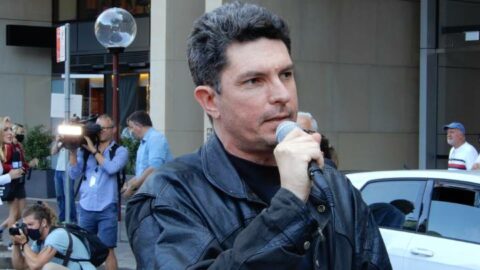
A recent article in the Saturday Paper, involved current plans by Origin Energy to close down the nation’s largest coal-fired power station, Eraring, as well as a recent decision by AGL to close two old coal-fired stations early.
Both these plans open the way for a transition to renewable energy. And in both cases, federal energy minister Angus Taylor spoke out against the moves of these key fossil fuel industry players.
Scott, if the Coalition is in the pocket of the industry, why is the minister actively opposing some of its decisions?
Some parts of the industry, in terms of utilities, can see the writing on the wall, and their investors are extremely nervous that they’re not going to get their money back.
They understand that the way forward is renewable energy – and not in a terribly disruptive mess – but in a phased way, in which workforces can see what’s coming and operators of the energy networks can plan and forecast what’s going to be needed.
So, there’s this large section of the industry that understands that this transition is well underway, and where the economic drivers are.
Then you’ve still got the federal energy minister completely acting according to the dictates of the coal and gas industries, who are simply desperate not to have these plants shutdown, because that’s their customer and that’s who they’re selling to.
They’re mounting a rather desperate rear-guard action, and the stakes are very high if they’re successful.
So, that scenario links into the concept of state capture and the report you’ve just co-written with Australia Democracy Network on this issue, Confronting State Capture.
So, broadly, how do you describe state capture? And as it is a global issue, what are some of the unique circumstances surrounding the capture of the Australian state by corporate interests?
It’s a term that has a global effect. The earliest that we can find the term having been used is by the World Bank in the 1990s, after the breakup of the Soviet Union.
They were using this term state capture to describe what’s happening in post-Soviet republics, which were getting on their feet with the trappings of democracy: emerging free media, civil society organisations and independent political parties.
At the same time, though, these nascent oligarchies were forming and capturing huge sectors of the economy.
I first came across the term when I was in South Africa researching a book, and they were using it there to describe this place that exists between corruption and oligarchy.
It’s this distinct set of institutional relationships that are much more systemic and entrenched than what we would ordinarily consider corruption, but it falls short of the definition of true oligarchy, where a lot of avenues for dissent and resistance start to be closed down.
It’s a distinct place in the middle.
The argument that we make in the Australian Democracy Network report is that Australia is suffering at the hands of state capture at least of the resources sector and the arms industry. They’re the two case studies we looked at.
This effectively means that elections don’t shift that institutional power, which is a very dangerous place to find yourself.
If you can’t use those electoral tools of reform to shift the powers of these energy incumbents or those tools are so heavily curtailed you can’t make policy change, then you can find yourself in a very dangerous place.
That’s why we thought it was worth publishing the report, as well as trying to introduce the phrase into the political lexicon.
Well, it’s certainly working, as I’ve noticed state capture mentioned a lot of late.
So, recently, we’ve seen megafires and floods. In the midst of all of this, we’ve seen the PM spruik a gas-fired recovery and stand on the global stage to present an empty net-zero climate action plan.
With the mounting crises, the public are somewhat dumbfounded to watch ministers, like him, acting in such a contradictory manner.
You’ve been on the inside of federal parliament. What would you say those outside of politics don’t have the benefit of witnessing that make these scenarios more comprehendible?
Part of the reason why we’ve made this study is to make it comprehensible to anybody, whether you work in politics or whether you’re doing something different.
A couple of things that I’ve observed firsthand is the fact that these industries really cover all the bases with lobbyists. They cover the field. If there is legislation in play, the crossbench votes are important, or when the opposition is making a stand, for any reason.
They saturate that building with lobbyists with redrafted amendments – laws that they have already written – and they’re looking for the support and the numbers.
The other thing that I have seen firsthand is the chilling effect the media can have when a major party politician knows that if they stake out a position that offends a powerful industry group, they’re going to be bludgeoned to death on the front page of the paper.
The press, which has very heavily concentrated ownership in Australia, still drives media cycles, even with the internet. It drives what’s going to be on breakfast TV. It drives what’s going to be on talkback radio. It drives what kind of content is going to be shared online.
There’s nothing sophisticated about the power of the press to run these attack campaigns for naked commercial advantage.
The property sector attacks property taxes. The resources sector attacks resource taxes. They are unashamedly pursuing commercial ambitions in the media, and that shapes political culture.
The Labor Party knows that all it took to destroy Kevin Rudd and the mining tax was $22 million spent over about six weeks. That’s all it takes.
So, that threat is now ever-present. It’s like this ambient threat of saturation carpet-bombing on the front page and on TV and radio.
The political common sense now, in order to get elected in this country, is to not offend anybody.
So, we’re having this bizarre election campaign where there are no policies – nothing is going to be announced.
In keeping with the fossil fuel industry as an example, besides the laws and policy decisions that greenlight new projects, what other aspects to state capture are in play that may not be so obvious?
When we were looking at the case study of the fossil fuel industries, and the way that we’ve structured the report, what you get under state capture as the foundation of it all is money.
They have access to enormous amounts of capital. They divert a relatively small amount of that into funding political parties or to funding third-party attack campaigns. That’s the first channel, the money.
The second is lobbying: the ability to build these relationships over a long period of time, whether through dedicated lobbying consultancies, direct CEO contact to ministers and MPs or through the peak bodies, which are enormously powerful.
They’re groups like the Minerals Council and the Business Council of Australia. They all have each other’s mobile numbers. They’re in very close contact when they want something.
The next channel is this phenomenon of the revolving door. People change careers. Career paths take you from media and communications to industry peak bodies into politics and back out the other side.
It’s this incredible merry-go-round if you track the career paths of senior people. You’re basically looking at a unified class that cuts across business and industry.
The fourth one we looked at is what’s mostly observable: the policy and the research efforts. So, whether that be the think tanks or the peak bodies.
It’s the fact that they have the ability to cover every Senate inquiry, and every Productivity Commission review. Sometimes they even set their own inquiries up, as they did with the COVID Recovery Commission, where it was stacked with gas execs.
Another one we looked at was institutional repurposing, which is where you take something like the CSIRO or the Bureau of Meteorology, or environmental protection authorities and you hollow out their public purpose.
You hollow this out by putting industry people on the board, changing its underpinning legislation and, gradually, you turn it from a public interest to a private industry.
For example, there’s the gas industry tie-up with CSIRO. The gas industry is basically laundering its own industry research through the CSIRO with its prestigious logo on the front cover that tells you that fracking is suddenly good for you.
The sixth avenue of state capture that we looked at was public influence campaigns that are run on traditional media platforms and now commonly more on social media.
Between those six different channels, industry has the ability now to write its own legislation, whether it be its own tax codes, or, in the example of Queensland, the Labor government is passing legislation specifically designed to attack Extinction Rebellion.
These laws are specifically designed to curtail certain kinds of civil society organising. That’s where this becomes particularly dangerous.
A discussion of state capture tends to focus on the fossil fuel industry for obvious reasons, but you’ve mentioned another major player is the arms industry. What sort of impact is that having on the nation?
We wanted to do more than one study because it’s good for the climate movement and the peace movement to make common cause and to understand that there is a lot there that’s shared.
And partly, because we wanted to compare and contrast. The way the resources lobby conducts state capture is different to the way the arms industry does it, they have different emphases.
What it means though is instead of a legitimate defensive role for the Australian Defence Force, what we have is these mindboggling and completely unjustifiable decisions to purchase, for example, US tanks, nuclear powered submarines, and joint strike fighters.
The procurement decisions aren’t being driven by any sort of rational planning process, or any kind of public engagement process, to understand what kind of equipment the ADF actually requires.
The process is being driven by the industry itself: by the US government and by the demands of these big weapons contractors.
This means we end up with equipment that doesn’t work: that is simply not fit for purpose.
It also means we end up with these bloated military budgets that are sucking the oxygen out of far more urgent priorities, whether that be poverty reduction or the ability to be prepared for natural disasters – or increasingly unnatural disasters.
Again, it’s dangerous in a different way. But it means the elected representatives are no longer really driving the bus.
The key decisions are being made in boardrooms of offshore arms manufacturers.
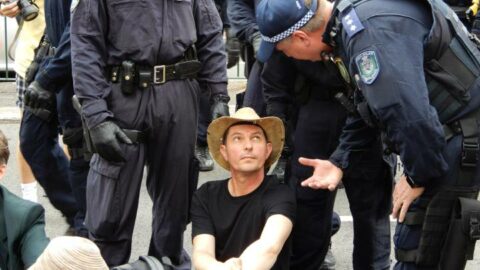
And lastly, Scott, the ADN analysis paints a bleak picture. Looking at the upcoming election, regardless of who gets voted in, both sides are ultimately captured by the same corporations and will advocate for the same outcomes.
So, is there a way out of this situation? And if so, what does it entail?
The report makes for bleak reading mainly because we concentrate on detailing how this machine operates: how it works. If we can get a better read on how it operates, more options open up on how to fight it.
The most important thing we can do is to stop speaking as it’s purely corruption, or on the opposite end of it, to not give up and say democracy is dead, and that these people hold all the cards, because they don’t.
The way out of it is to ensure that we are only electing people who aren’t taking the money and who aren’t part of this revolving door between industry and politics.
There is a huge move afoot for this big raucous crossbench, whether they be some of the independents chipping away at Liberal seats or the Greens, who don’t bank cheques from these huge companies.
We could actually be looking at a balance of power situation in the House of Representatives and the largest ever Senate crossbench made up of people who are fighting for integrity and climate action.
This gives me an enormous amount of hope.
They won’t have the numbers to form government, but they may be in a position to negotiate over who does.
We know how powerful that is because it happened in 2010, when there was this auction between Tony Abbott and Julia Gillard, as to who was going to form government and the person with the best energy act was the result.
So partly, I’m of the view that the election does give us this real opportunity to push a bit of a crack in the armour and get people elected who aren’t a part of this state capture system.
But the report is also that cautionary tale that some of these actions have to be extra-parliamentary.
We have to raise the costs and the consequences for the entities doing the capturing, which is part of the project of removing social licence from the industries that are burning the future down.
So, change might be on its way?
Change is absolutely on its way, whether we like it or not.
We’re fighting for positive change and for progressive and hopeful change. But change is coming one way or another.
